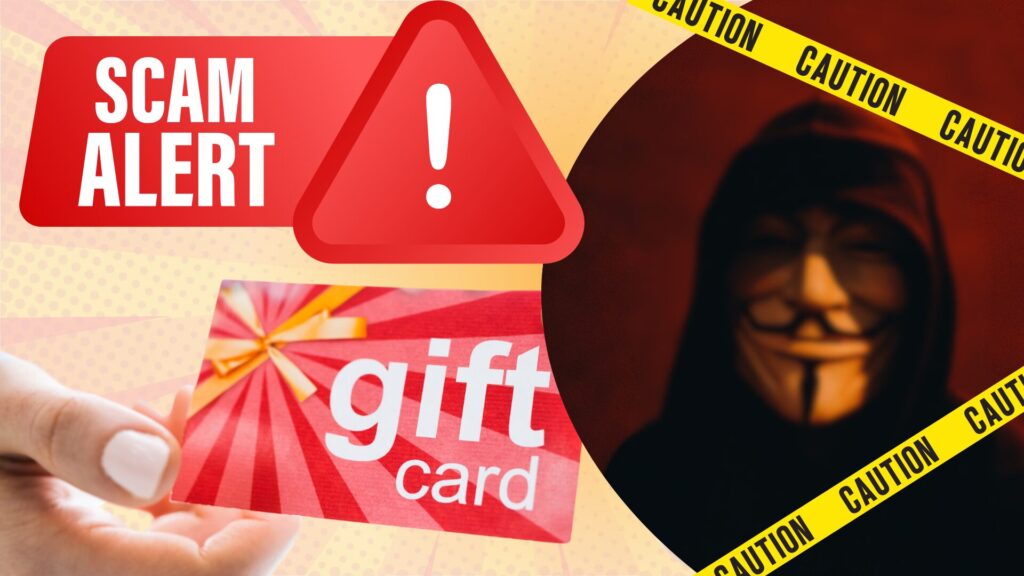The Silent Heist Happening in Your Inbox

Imagine this: You’re in the middle of a hectic workday when you get an urgent email from your CEO. “Hey, I need you to grab $2,000 in Amazon gift cards for a client appreciation event ASAP. Just send me the codes when you get them. Thanks!” Seems legit, right? Wrong. You’ve just been targeted by a gift card scam—a scam that’s quietly draining businesses of thousands of dollars every day.
Gift card scams aren’t just hitting consumers anymore; they’re infiltrating businesses, preying on trust, urgency, and employees who don’t want to question authority. If you’re not aware of how these scams work, your company could be the next victim.
How Do Gift Card Scams Work?
These scams are social engineering at its finest—tricking people into making bad decisions before they even realize something is off. Scammers impersonate executives, vendors, or clients, crafting emails or texts that look shockingly real. The goal? Convince an unsuspecting employee to buy gift cards and send over the codes, which are then quickly cashed out by the scammers.
Common Tactics Used by Scammers:
???? Impersonation – They pose as high-level executives, using spoofed emails that look almost identical to real ones.
???? Urgency – They create panic. “I need this right now” leaves little room for second-guessing.
???? Secrecy – They discourage employees from confirming the request. “Let’s keep this a surprise” is a classic trick.
???? Use of Realistic Language – Modern scam emails have improved grammar, company branding, and even internal references to look credible.
???? Spoofed Domains & Email Addresses – A common trick is using slight variations of real company domains (e.g., @yourcompany.co instead of @yourcompany.com).
Real-Life Scenario: A Chicago law firm lost $8,000 in a single afternoon when a paralegal received what she thought was a legitimate request from a senior partner. The email was fake, but the damage was real.
Spotting the Red Flags Before It’s Too Late
These scams can be sneaky, but they all have telltale signs:
???? Odd Requests: If an executive has never asked for gift cards before, why now?
???? Subtle Email Address Changes: Hover over the sender’s address—does it match your company’s domain exactly, or is there a slight difference?
???? Generic or Unusual Greetings: “Dear Employee” or an informal “Hey, can you do me a favor?” can be signs of fraud.
???? Unusual Payment Methods: Legitimate vendors or partners don’t typically ask for gift cards instead of standard payments.
???? Requests Outside Normal Channels: If financial requests usually go through accounting, but you get one directly via email or text, that’s a red flag.
???? A Demand for Secrecy: Any message that insists on keeping things under wraps is a major red flag.
Why Businesses Are Prime Targets
If you’re thinking, “Why would scammers go after businesses instead of individuals?” the answer is simple—bigger payouts and easier trust exploitation.
???? CEO Fraud (Executive Impersonation) – Employees are wired to obey senior leadership, and scammers take full advantage of this.
???? Fake Vendor or Client Requests – “Hey, we’re switching up our payment methods. Can you pay via gift cards instead?” Some businesses fall for it.
???? Phishing Attacks to Gain Inside Access – If a hacker gets access to an employee’s email, they can send out fake requests that look totally legit.
???? Social Media Reconnaissance – Scammers monitor LinkedIn and company websites to learn names, job titles, and ongoing company events to make their scams more convincing.
Protecting Your Business from Gift Card Scams
✅ Educate Your Team – Regular cybersecurity training keeps employees sharp and skeptical of odd requests.
✅ Implement a Double-Check Policy – Any financial request, no matter how small, should require a second layer of verification.
✅ Check Your Email Banners – Many email security systems display warnings when an email comes from a first-time sender, an unusual domain, or an external address that appears suspicious. Always review these banners before taking action.
✅ Enhance Email Security – We install email filters that flag suspicious senders, implement domain authentication, and enforce multi-factor authentication (MFA) for logins.
✅ Encourage Employees to Speak Up – A company culture where employees feel safe questioning odd requests can save thousands.
✅ Limit Internal Sharing of Executive Contact Info – Restrict publicly available information that scammers can use to impersonate leadership.
What to Do If You Get Scammed
Even with precautions, mistakes happen. If your business gets hit:
???? Report It Immediately – Notify us, as well as law enforcement and the Federal Trade Commission (FTC).
???? Alert the Gift Card Provider – Some companies may be able to freeze unused balances if you act fast.
???? Assess & Strengthen Security Measures – Identify how the scam slipped through and lock down those vulnerabilities.
???? Warn Employees and Clients – If scammers have targeted your business, they might try again or target others in your network.
Conclusion: Stay Sharp, Stay Skeptical
Gift card scams are on the rise, but your business doesn’t have to be the next victim. A mix of awareness, verification processes, and cybersecurity best practices can keep scammers at bay. Remember—if an email request feels off, it probably is.
Check out additional information from these sources:
- Federal Trade Commission – Gift Card Scams
- FBI Cyber Crime – Business Email Compromise
- National Cybersecurity Alliance – Spotting Email Scams
Want more insights on keeping your business safe from cyber threats? Reach out to us for expert guidance. Because when it comes to cybersecurity, it’s better to be paranoid than to be sorry.

